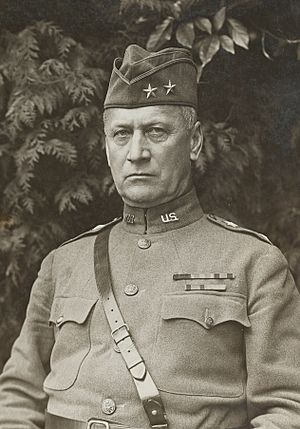Charles Henry Muir facts for kids
Quick facts for kids
Charles Muir
|
|
|---|---|

Major General Charles Muir as commander of the IV corps in October 1918
|
|
| Born | 18 July 1860 Erie Township, Michigan |
| Died | 8 December 1933 (aged 73) Baltimore, Maryland |
| Place of burial | |
| Allegiance | |
| Service/ |
|
| Years of service | 1885–1920 |
| Rank | |
| Commands held | 28th Infantry Division IV Corps Commandant of the United States Army Command and General Staff College |
| Battles/wars | World War I
|
| Awards | Indian Campaign Medal Spanish Campaign Medal |
| Relations | MG James Irvin Muir (son) |
Charles Henry Muir (July 18, 1860 – December 8, 1933) was a major general in the United States Army. He served on active duty during the American Indian Wars, Spanish–American War, Philippine–American War, occupation of Cuba, and World War I.
Contents
Military career
Muir received an appointment to the United States Military Academy at West Point, New York in 1881, graduating eighth in his class in 1885. After receiving his commission as a second lieutenant in the United States Army, Muir was sent to Dakota Territory and later to Fort D.A. Russell in Wyoming. He held first place on the Army Rifle Team in 1890. In 1895, Muir graduated at the head of his class from the Infantry and Cavalry School in Fort Leavenworth in Kansas.
Muir was deployed to Cuba during the Spanish–American War, where he received the Distinguished Service Cross for gallantry in action during the Battle of Santiago de Cuba. On July 2, 1898, he had voluntarily exposed himself to heavy enemy artillery and infantry fire in an action which resulted in the silencing of a piece of Spanish artillery.
Muir was promoted to Captain on 2 March 1899. Later that year he was promoted to Major and sent to the Philippines. Muir was assigned to a unit under the command of Brigadier general Robert Henry Hall. On 19 January 1900, Muir and ten other American soldiers attacked the headquarters of General Miguel Malvar at Rosario in Batangas province, driving Malvar and his men out. Muir's unit took possession of 25,000 Mexican pesos from Malvar's treasury and released 300 Spanish prisoners.
From 1903 to 1907, he was a member of the general staff at Washington, D.C..
Major General Muir succeeded Charles M. Clement as Commander of the 28th Infantry Division from 15 December 1917 until 23 October 1918, when he was succeeded by William H. May. Muir commanded IV Corps until April, 1919 when he succeeded Hay as commander of the 28th Division and led it to the United States for its post-war demobilization. He was succeeded by William G. Price Jr. when the division was reorganized as part of the Pennsylvania National Guard.
From July 1919 to August 1920, MG Muir served as Commandant of the United States Army Command and General Staff College. His final duty assignment was at the War Department in Washington, D.C., after which he retired from the Army.
Awards
He received the Distinguished Service Cross, the Army Distinguished Service Medal, and a Silver Star Citation. From France, he received a Croix de Guerre. He was made a Knight Commander of the Order of St. Michael and St. George.
Death and legacy
He died on December 8, 1933. He is buried in Arlington National Cemetery.
Family
In 1887, Muir married May Bennett, the daughter of Colonel Clarence Edmund Bennett. They were the parents of three sons and a daughter, including James I. Muir, who was a career Army officer and attained the rank of major general as commander of the 44th Infantry Division during World War II.
Namesakes
- Muir Army Airfield
- USS General C. H. Muir (AP-142)
The General Muir, restaurant and deli, Atlanta, Georgia.

